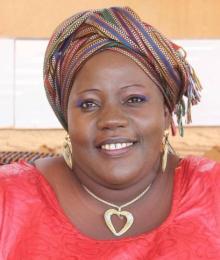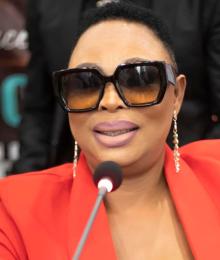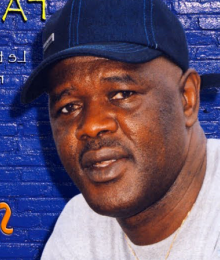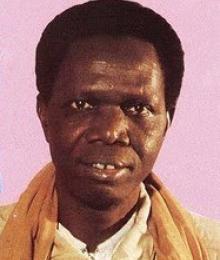
Odia Fanta Bérété, also known as Wodia Fanta or Odylle Fanta, is a renowned Guinean actress and performer who has left an indelible mark on the country’s theatrical history. Born in 1970 in Kankan, she moved to Conakry at a young age, where she discovered her passion for theater, inspired by the televised performances of the Benso-Sodia troupe. A self-taught and determined artist, she joined this troupe at the age of 17 and remained an active member for over 37 years, playing standout roles in productions such as Bangaly Bengazi, N'na ta, and Fadala. Her natural talent, versatility, and commanding stage presence have earned her a place among the most respected figures in Guinean theater.
Beyond her artistic career, Odia Fanta Bérété is also a committed advocate for the arts, fully aware of the challenges facing contemporary Guinean theater. In response to the sector’s instability and lack of institutional support, she has successfully reinvented herself by partnering with a French producer to share her work on YouTube—earning royalties while also venturing into business. Through her public statements, she calls on the authorities to provide better support for Guinean artists and advocates for the preservation of local cultural values in the face of foreign influences. Her journey stands as a powerful symbol of resilience, dedication, and deep love for Guinean dramatic arts.
Introduction
Odia Fanta Bérété, also known as Wodia Fanta or Odylle Fanta, is a Guinean actress and comedian who has left an indelible mark on her country's theatrical history. A central figure in the Benso-Sodia troupe for over three decades, her journey reflects the passion and perseverance of a self-taught artist who has made significant contributions to Guinea's cultural landscape.
Humble Origins and the Discovery of a Passion
Born in 1970 in Kankan, eastern Guinea, Fanta Bérété is the daughter of the late Sékou and the late Wodia Kaba. Her path is all the more remarkable considering she never attended school. At a young age, she left her hometown to move to Conakry, the capital, where she was taken in by her older sister, Hadja Doussou Kaba.
Initially directed toward learning sewing, a trade that didn’t align with her true interests, Fanta soon discovered her genuine calling—acting. At just 17 years old, inspired by the performances of the Benso-Sodia troupe broadcast on national television, particularly the film Franyira, she decided to embark on an artistic journey.
Challenging but Promising Beginnings
Fanta’s entry into the world of theater was not without obstacles. Her family strongly opposed her career choice, deeming it unconventional for a young woman. This familial resistance led to a temporary break in communication with her older brother, who took two months to accept her decision.
Even within the Benso-Sodia troupe, her young age was initially seen as a barrier. During her audition, although she gave a brilliant performance as "N'na Doussouba"—a hypocritical woman caught between two co-wives—her talent was evident, but the role was considered too mature for her. Nonetheless, the troupe's leadership, impressed by her natural abilities, decided to bring her on board.
Rich and Diverse Career
Over her 37 years with Benso-Sodia (1987–2024), Odia Fanta Bérété starred in numerous productions that left a lasting impact on Guinean culture. Some of her most memorable roles include N'na Kanin ni Wanka, Bily ni Bébé, Bangaly Bengazi, N'na ta, Abou nin Minata, and Fadala.
Her versatility enabled her to portray a wide range of characters—from villains to heroes to deeply emotional figures. This flexibility, combined with her natural stage presence, often earned her lead roles in major productions such as Bangaly Bengazi, N'na ta, and Fadala.
Personal Life and Hardships
Odia Fanta Bérété’s personal life has been marked by both joy and profound sorrow. She was married to a fellow actor from the Benso-Sodia troupe, the late Bengazi, with whom she had one son. Tragically, her husband passed away 15years after their marriage, a loss that brought immense grief. She has since remarried and currently resides in Lansanaya Barrage, a neighborhood in Conakry.
Challenges Facing Contemporary Guinean Theater
Through her personal account, Fanta Bérété highlights the many challenges facing Guinean artists today, particularly those associated with the Benso-Sodia troupe. A lack of financial and material resources, limited rehearsal space, absence of cameras, and transportation difficulties are major hurdles to theatrical production.
She specifically laments the loss of support once provided by the Guinean National Radio and Television (RTG), which used to offer filming equipment, technical staff, and logistical assistance to troupes. Without this institutional backing, Benso-Sodia and other historic groups have gradually disappeared from television.
Adapting and Diversifying Income
In response to these challenges, Odia Fanta Bérété has had to diversify her sources of income. With Benso-Sodia now inactive and no longer providing income, she collaborates with a French producer named Alexandre, who distributes her work on YouTube. Through this partnership, she receives 50% of the revenue generated by each production.
She also receives royalties from the Guinean Copyright Office (BGDA), both for her own works and those of her late husband. In addition, she is engaged in commercial activities and receives support from her current spouse.
Critical View on the Evolution of Guinean Theater
With the wisdom of experience, Fanta Bérété offers a critical perspective on the evolution of Guinean theater. She is concerned about the proliferation of unaccredited troupes producing content without any real quality control. She also expresses regret over the growing tendency to imitate foreign cultures at the expense of traditional Guinean values.
For younger artists, she strongly recommends drawing inspiration from past productions and consulting with experienced performers. She fondly recalls a time when her troupe worked alongside great griots like Amadou Sodia, the late Freddy Taxi t'adore, the late N'Koro Mamoudou, and the late N’nakanin, who shared deep knowledge of Guinean customs and traditions.
A Call to Authorities
Odia Fanta Bérété makes a heartfelt appeal to Guinean authorities—especially the Ministry of Culture—to provide greater attention and support to local artists. She emphasizes the vital role theater troupes have played in shaping national culture and mourns the fact that many artists pass away in anonymity despite their significant contributions.
“We have worked for this country, and we can continue to do so if the right support is provided,” she affirms passionately. Her message is clear: artists deserve recognition and support during their lifetimes, not just posthumous honors.
Conclusion
Odia Fanta Bérété’s journey is a testament to unwavering passion for theatrical art and remarkable resilience in the face of adversity. Her story embodies the cultural richness of Guinea and serves as a powerful reminder of the need to preserve and elevate the country’s artistic heritage.






















